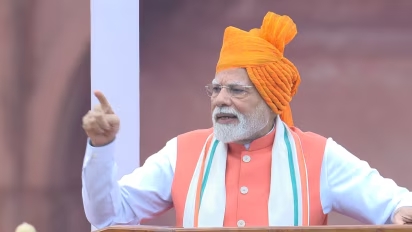NewsGate Press Network
Come Diwali this year, an enhanced and better GST regime will be implemented said the Prime Minister Narender Modi in his I-Day speech.
It was his 12th straight address from the ramparts of the Red Fort on the occasion of 79th Independence Day,
The Prime Minister laid out a bold vision for a Viksit Bharat — a developed and self-reliant India — emphasising the need to move forward with renewed strength and greater determination.
His assertive pitch for self-reliance comes amid rising trade tensions with the United States, indicating that India will not compromise its sovereignty, its farmers, or its self-reliance.
Reflecting on India’s transformation over the past decade, the Prime Minister said, “India has been reforming, performing, and transforming. Now, the time has come to accelerate this journey with even greater resolve.”
Modi underscored the government’s commitment to building a modern, efficient, and citizen-first governance ecosystem, rooted in simplicity, transparency, and opportunity.
At the outset of his speech the PM highlighted the government’s decade-long effort to reform the administrative and legal architecture of the country.
He announced that over 40,000 unnecessary compliances have been scrapped, and more than 1,500 obsolete laws repealed. In the recent parliamentary session alone, over 280 provisions were removed to streamline governance, he added.
“Reform is not only about economics,” the Prime Minister noted, “it is about transforming the everyday life of the common citizen.”
Among the key reforms, he cited faceless income tax assessment for greater transparency, zero income tax for individuals earning up to Rs 12 lakh per annum and the Indian Justice Code replacing colonial-era criminal laws. He also announced Rs One lakh crore PM Viksit Bharat Yuva Rojgar Yojana aiming to provide Rs 15,000 from the government to youth on landing 1st private-sector job.
Modi said that the Rojgar Yojana will create nearly 3.5 crore new employment opportunities for the youth.
Recognising the role of entrepreneurs and MSMEs in India’s self-reliant growth story, Modi outlined reforms designed to reduce compliance burdens, eliminate fear of arbitrary legal action, and create a climate conducive to innovation and investment.
To take this effort forward, he announced the formation of a Task Force on Next-Generation Reforms, which will conduct a comprehensive review of existing laws, regulations, and procedures related to economic activity. Its objectives include:
The Prime Minister unveiled plans for Next-Generation GST Reforms to be rolled out by Diwali 2025, aimed at easing the tax burden on citizens and stimulating consumption. “The new GST reforms will lower taxes on daily-use items,” he said, calling it a “Diwali gift” for the people.
The Prime Minister also shared that India will launch ‘Made in India’ semiconductor chips by the end of 2025, reflecting the nation’s growing strength in critical technology sectors. He emphasised innovation in AI, cyber security, deep-tech, and operating systems for global competitiveness.
Modi reiterated his government’s long-term vision of making India a developed nation by 2047, as it marks 100 years of independence. “India must not compare itself with others but focus on expanding its own capabilities,” he said. Making a point, Modi said that when freedom fighters sacrificed their lives to make India free from the clutches of slavery, now the cudgel lies on the citizens of free India to make the country a samradh (strong) Viksit Bharat.
“In today’s world of growing self-interest, India must stand strong through its own capabilities. The focus must be on resilience, opportunity, and inclusive growth,” he said.


Comments are closed for this post.